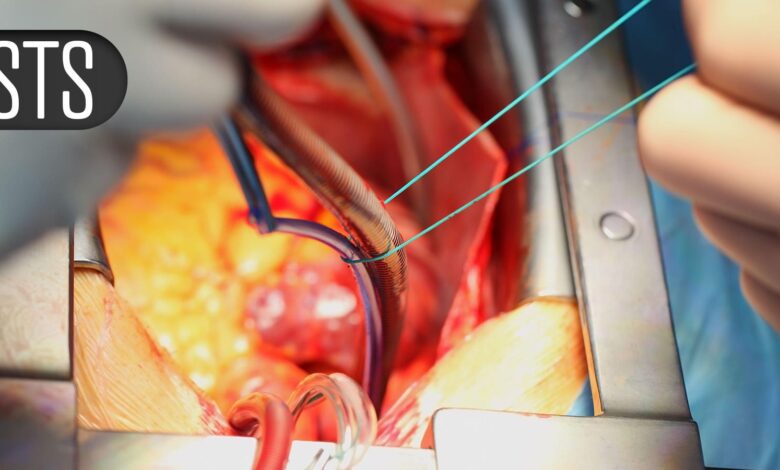Heart Surgeons Wary of Being ‘Left Behind’ in Tricuspid Innovation

—
“We’ve got to find a better pathway to be involved”
by
Nicole Lou,
Senior Staff Writer, MedPage Today
January 26, 2025
LOS ANGELES — Cardiac surgeons were urged to readjust their attitudes toward the tricuspid valve if they want to keep some footing in a rapidly evolving field dominated by transcatheter innovations.
At the Society of Thoracic Surgeons (STS) annual meeting, it was standing room only at a session dedicated to why the tricuspid valve should no longer be considered the “forgotten” valve.
“This is a massive issue for us right now,” said session co-moderator Joseph Bavaria, MD, of Jefferson Health and Hospital of the University of Pennsylvania in Philadelphia. “We have CMS deciding how to pay for endovascular tricuspid management. We have new data from the STS database and other databases regarding the tricuspid universe in Europe and in North America. So it’s really kind of an exciting area.”
Due to a typically older, sicker profile, most patients with tricuspid regurgitation (TR) have historically avoided surgery. The paucity of treatment alternatives changed last year when two devices got FDA approval for transcatheter tricuspid valve intervention: the Evoque tricuspid valve replacement system in February 2024 and the TriClip transcatheter edge-to-edge repair (TEER) device in April 2024. A slate of other devices, such as the Pascal and Cardioband TR, are being eyed for their potential to also enter the U.S. market.
The caveat is that the quality-of-life benefits with these transcatheter procedures have not translated into improved survival, at least not by 1 year. There are also the long-term issues of thrombosis, durability, and re-intervention associated with tricuspid valve procedures, according to Vinod Thourani, MD, of Piedmont Heart Institute in Atlanta.
Here at STS, the surgeons expressed greater intent to operate on the tricuspid valve before they are shut out completely.
CMS recently proposed a National Coverage Determination for transcatheter tricuspid valve replacement that — unlike the more established transcatheter aortic valve replacement (TAVR) — does not require cardiac surgeons to have the same weight as interventional cardiologists in judging a patient’s suitability for the procedure, as part of a heart team.
“They think surgeons are not necessary whatsoever,” Thourani commented. “We are better if we work together as the heart team.”
“The problem is what the cardiologists said about us, is that we don’t show up, we don’t see the patient. They refer a patient to a TAVR and we say ‘We’ll see you in a month.’ So surgeons are disengaged, and the reason cardiology is able to push through stuff and have us potentially not part of the heart team is because of the disengagement of us. So we’ve got to find a better pathway to be involved. If we don’t, I promise you … we will get left behind,” Thourani warned.
At the rate things are going, audience member Gorav Ailawadi, MD, of University of Michigan in Ann Arbor, also predicted even fewer surgical cases in 5 years. Part of what’s left would be the surgical management of failed TEER cases, he suggested.
“We’re going to see the failures that we’re going to have to operate on,” Ailawadi said. “I can’t imagine [an Evoque explant]. Some of you may have done it; it’ll be very difficult, I think.”
Volkmar Falk, MD, of Deutsches Herzzentrum der Charité in Berlin, cited the estimate that TEER is unsuccessful 35% of the time, and this is a source of poor outcomes and requires surgical management.
“These patients present a particular challenge, and we see more and more of those,” said Falk, providing the perspective from Europe, where operators have more experience with transcatheter tricuspid technologies as European regulators had already started clearing them years ago.
Falk reported that in his experience in Europe, tricuspid valve surgery is still the treatment of choice for primary tricuspid regurgitation and for patients with concomitant left-sided valvular heart disease. In secondary tricuspid TR and low-risk patients, surgery and transcatheter treatment are increasingly competing, whereas in intermediate and high- surgical risk groups, transcatheter treatment is becoming the treatment of choice.
To help define risk in practice, panelist Michael Bowdish, MD, MS, of Cedars-Sinai Medical Center in Los Angeles, highlighted the development of the STS Tricuspid Valve Surgery Risk Calculator.
Bowdish debunked the common beliefs “that the tricuspid valve doesn’t matter” and “that tricuspid valve surgery is difficult and associated with poor outcomes.”
He cited his group’s study that found an operative mortality rate of 7.3% in isolated tricuspid valve surgery in patients without endocarditis. Taking into account one’s model for end-stage liver disease (MELD) score, those with the lowest MELD scores saw a 30-day mortality of just 3.2%, he reported.
“So there’s an indication there that maybe this isn’t really such as bad an operation as we think it is,” Bowdish stressed.
“Surgery has improving outcomes and can be done with excellent results,” agreed Thourani. “But very little innovation has occurred in surgical techniques in my 19 years of practice and very little prospective data gathered on a consistent basis.”
Disclosures
Bavaria had no disclosures.
Bowdish disclosed research funding from Renibus Therapeutics.
Falk disclosed various institutional and/or personal ties to Medtronic, Abbott, Abiomed, Berlin Heart, Biotronik, Boston Scientific, Edwards Lifesciences, Jotec GmbH, Liva Nova, and Novartis.
Thourani disclosed various relationships with Abbott Vascular, AtriCure, Boston Scientific, DASI Simulations, Edwards Lifesciences, Jenavalve, and Medtronic.


